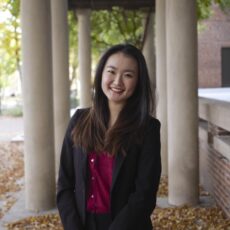
Carbon Credits: Key to Nonprofit Sustainability in Morocco
For the High Atlas Foundation in Marrakech, the growing voluntary carbon credit market will revolutionize the sustainability of the organization and help reach their goal of planting one billion trees.
The school year had barely come to an end and, I, alongside three representatives from our team, were already on our way to New York City to catch our flight to Casablanca, Morocco. As members of the organization Penn International Impact Consulting, we had partnered with a nonprofit organization High Atlas Foundation (HAF) based in Marrakech, Morocco as their financial and business consultants for the school year.
The High Atlas Foundation implements sustainable agriculture methods to invest in human development initiatives in Moroccan communities, including women empowerment, education, health, and capacity building. Throughout the year, our consulting team researched market trends and constructed business plans, and for our final deliverable, we took a trip to the tree nursery sites in Marrakech to meet the nursery caretakers and complete our recommendations.

Our team worked on two primary objectives: drafting a grant proposal and creating a business plan for the implementation of biodegradable bags in HAF’s current agriculture model. To prepare for the grant proposal, I helped spearhead the research on carbon credits. HAF, through their sustainable agriculture methods of growing a wide variety of fruit trees, aims to sell globally competitive and voluntary certifiable credit offsets as a new revenue driver, with certified carbon credits currently being sold at USD 7.53 per ton. Through the development of an application with Red Barn Technology and methods to monitor and gather data through an adaptive management system, HAF is planning on recording, storing, and verifying carbon sequestration based on tree height and tree diameters to accurately measure viable carbon credits.
After assessing how HAF’s tree nurseries will become profitable after one year of establishment and recognizing how individual farmers may be able to sell carbon credits due to the changes made in COP 26, our team recommended the use of the Carbon Trade Exchange platform and a collaboration with the Carbon Partnership Facility. The Carbon Trade Exchange is the first global electronic exchange for buyers and sellers in the voluntary carbon market with the advantages of transparent and cost effectiveness, access to the global market, a variety of carbon sales, and minimal costs associated with membership. Moreover, HAF would benefit from working with the Carbon Partnership Facility, which connects buyers and sellers of carbon credits while working with partner countries to encourage low-carbon economies.

Our second project was creating a business plan to help HAF convert from using plastic bags to biodegradable bags to grow their trees. HAF has committed to planting one billion trees and recognized the mass amount of plastic they would be throwing away, as each plant requires a one-time bag during the first six months. Our team created a proposal where HAF would purchase wholesale PLA sheets and the bags would be produced by the women cooperatives that HAF helped support during their women empowerment workshops. Through this process (while it may be a little more costly than the plastic bags currently used), HAF aspires to integrate their community development work into the fabric of their sustainable agriculture while adhering to their commitment to environmentally conscious efforts.
Ultimately, HAF’s greatest attribute is their internal circular economy present within the organization: thousands of trees are grown in the nurseries through sustainable methods producing carbon credits, the trees are sold at a symbolic price to community farmers, and the revenue of selling carbon credits is funneled back to purchase more seeds for the nurseries. For HAF, carbon credits are not only an environmentally sustainable outlet but the key to sustaining the organization at its core.
Seo Yoon (Yoonie) Yang
Hunstman Program, SAS and WhartonYoonie is a student in the Huntsman Program, pursuing International Studies in the College of Arts and Sciences and Business Ethics in the Wharton School. She is currently involved in Mock Trial, Penn International Impact Consulting, Penn Law Journal, and Nominations and Elections Committee at Penn.

